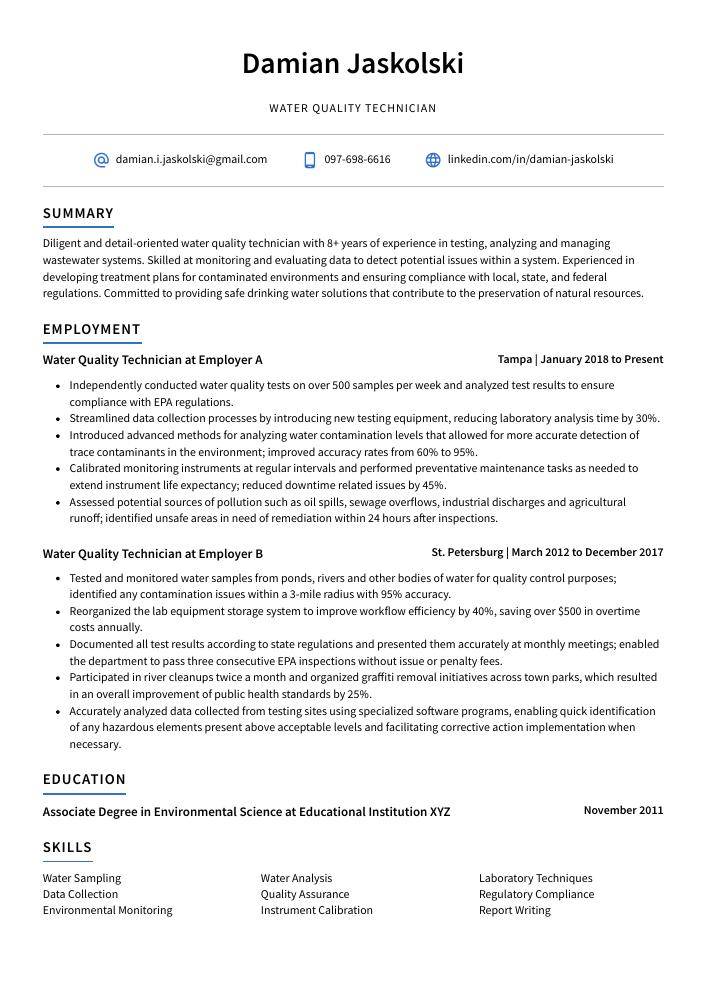Water Quality Technician Resume Guide
Water quality technicians collect water samples and test them for various contaminants. They also monitor water treatment plants and equipment to ensure they operate correctly. Water quality technicians may also be responsible for conducting public education programs on water conservation and the proper use of septic systems.
You have an impressive track record in water quality testing, but hiring managers don’t know about it. To let them see what you can bring to the table, you need to create a resume that stands out from the crowd.
This guide will walk you through the entire process of creating a top-notch resume. We first show you a complete example and then break down what each resume section should look like.
Table of Contents
The guide is divided into sections for your convenience. You can read it from beginning to end or use the table of contents below to jump to a specific part.
Water Quality Technician Resume Sample
Damian Jaskolski
Water Quality Technician
damian.i.jaskolski@gmail.com
097-698-6616
linkedin.com/in/damian-jaskolski
Summary
Diligent and detail-oriented water quality technician with 8+ years of experience in testing, analyzing, and managing wastewater systems. Skilled at monitoring and evaluating data to detect potential issues within a system. Experienced in developing treatment plans for contaminated environments and ensuring compliance with local, state, and federal regulations. Committed to providing safe drinking water solutions that contribute to the preservation of natural resources.
Experience
Water Quality Technician, Employer A
Tampa, Jan 2018 – Present
- Independently conducted water quality tests on over 100 samples per week and analyzed test results to ensure compliance with EPA regulations.
- Streamlined data collection processes by introducing new testing equipment, reducing laboratory analysis time by 30%.
- Introduced advanced methods for analyzing water contamination levels that allowed for more accurate detection of trace contaminants in the environment; improved accuracy rates from 60% to 95%.
- Calibrated monitoring instruments at regular intervals and performed preventative maintenance tasks as needed to extend instrument life expectancy; reduced downtime-related issues by 45%.
- Assessed potential sources of pollution such as oil spills, sewage overflows, industrial discharges, and agricultural runoff; identified unsafe areas needing remediation within 24 hours after inspections.
Water Quality Technician, Employer B
St. Petersburg, Mar 2012 – Dec 2017
- Tested and monitored water samples from ponds, rivers, and other bodies of water for quality control purposes; identified any contamination issues within a 3-mile radius with 95% accuracy.
- Reorganized the lab equipment storage system to improve workflow efficiency by 40%, saving over $16,500 in overtime costs annually.
- Documented all test results according to state regulations and presented them accurately at monthly meetings; enabled the department to pass three consecutive EPA inspections without issue or penalty fees.
- Participated in river cleanups once a month and organized graffiti removal initiatives across town parks, which improved public health standards by 25%.
- Accurately analyzed data collected from testing sites using specialized software programs, enabling quick identification of any hazardous elements present above acceptable levels and facilitating corrective action implementation when necessary.
Skills
- Water Sampling
- Water Analysis
- Laboratory Techniques
- Data Collection
- Quality Assurance
- Regulatory Compliance
- Environmental Monitoring
- Instrument Calibration
- Report Writing
Education
Associate Degree in Environmental Science
Educational Institution XYZ
Nov 2011
Certifications
Certified Water Quality Technician
National Environmental Health Association (NEHA)
May 2017
1. Summary / Objective
Your resume summary/objective should be a concise overview of your skills and experience as a water quality technician. You can use this section to highlight the most important aspects of your background, such as the certifications you hold, any specialized training in water testing or analysis that you have received, and how many years of experience you have in this field. You could also mention any research projects or initiatives related to water quality that you’ve been involved with.
Below are some resume summary examples:
Reliable water quality technician with over five years of experience conducting water analysis, testing, and reporting as per EPA standards. Proven track record in researching new methods for improving the accuracy of data collected and analyzing results to detect hazardous substances. Possess strong problem-solving skills, excellent communication abilities, and an eye for detail. Committed to protecting public health by ensuring safe drinking water at all times.
Seasoned water quality technician with 10+ years of experience working in water treatment plants. Experienced in monitoring, analyzing, and collecting samples from various sources to ensure that the local water supply is safe for consumption. Received a certificate of recognition for helping improve efficiency by 20%. Skilled at conducting onsite analysis tests and providing detailed reports to the management team regarding potential contamination levels.
Proficient water quality technician with 5+ years of experience testing and analyzing water samples. Seeking to apply expertise at ABC Water Company to ensure drinking water safety for community members. At XYZ, conducted several tests on water sources daily, ensuring compliance with government regulations and providing accurate data reports. Received “Employee of the Year” award in recognition of excellence in service delivery.
Hard-working water quality technician with 7+ years of experience in water and wastewater treatment. Skilled at collecting, analyzing, interpreting, and reporting data from lab tests according to government regulations. Dedicated to ensuring safe drinking water for the community by performing routine inspections and maintenance tasks on distribution systems. Seeking an opportunity to join ABC Water District as a Water Quality Technician.
Professional water quality technician with 5+ years of experience conducting analyses, interpreting results, and preparing reports for the Environmental Protection Agency. Proven ability to identify water pollution sources, implement corrective measures and ensure compliance with local regulations. Seeking an opportunity at ABC Technologies to use my expertise in water analysis and help improve public health standards.
Talented water quality technician with 5+ years of hands-on experience in water sampling, testing, and analysis. Versed in various laboratory techniques to evaluate the chemical, physical and biological properties of water. Proven track record for meeting compliance requirements while keeping safety as a top priority. Seeking to join ABC Company to provide accurate data on the condition of drinking water sources.
Accomplished water quality technician with 8+ years of experience monitoring water sources and ensuring compliance with EPA regulations. Adaptable to working in both laboratory and field environments, as well as collaborating with diverse stakeholders. At XYZ Corp, discovered a new source of contamination that resulted in the implementation of more stringent safety protocols – reducing health risks by 8%.
Detail-oriented water quality technician with 5+ years of experience in water testing, analysis, and reporting. At XYZ Water Company, led a team of four technicians to analyze over 50 samples daily while meeting all safety standards. Seeking to join ABC as a water quality technician, where I can use my expertise to ensure the highest standards for safe drinking water are met.
2. Experience / Employment
In the experience section, you should list your employment history in reverse chronological order. This means that the most recent job is listed first.
When writing about what you did in each role, use bullet points to make it easier for the reader to take in information quickly and easily. When stating what you did, provide details on how exactly you achieved results or solved problems.
For example, instead of saying “Tested water quality,” say something like: “Performed weekly tests on water samples from various sources using a variety of analytical instruments; identified potential pollutants and reported findings.”
To write effective bullet points, begin with a strong verb or adverb. Industry-specific verbs to use are:
- Monitored
- Collected
- Analyzed
- Tested
- Recorded
- Operated
- Inspected
- Calibrated
- Sampled
- Reported
- Evaluated
- Adjusted
- Researched
- Interpreted
- Documented
Other general verbs you can use are:
- Achieved
- Advised
- Assessed
- Compiled
- Coordinated
- Demonstrated
- Developed
- Expedited
- Facilitated
- Formulated
- Improved
- Introduced
- Mentored
- Optimized
- Participated
- Prepared
- Presented
- Reduced
- Reorganized
- Represented
- Revised
- Spearheaded
- Streamlined
- Structured
- Utilized
Below are some example bullet points:
- Achieved 97% accuracy in analyzing water samples for contaminants such as bacteria, lead, and chemicals according to EPA standards.
- Improved response times by 50%, allowing test results to be communicated within 24 hours of sample collection under most circumstances.
- Optimized the testing process, resulting in a 10% reduction in laboratory costs over the past year.
- Interpreted complex data from lab tests and generated comprehensive reports on contamination levels with detailed recommendations for corrective actions when necessary.
- Reliably operated advanced analytical instruments, including spectrophotometers, chromatographs, and mass spectrometers, to accurately measure water quality parameters per protocol requirements.
- Compiled and submitted weekly water quality reports for 10+ local watersheds, summarizing results of routine testing and identifying any trends or anomalies.
- Analyzed 15+ samples daily using specialized equipment such as pH meters, turbidimeters, and spectrophotometers; increased accuracy levels by 20%.
- Successfully identified the presence of pollutants in two separate bodies of water and reported findings to appropriate agencies for corrective action within 48 hours.
- Demonstrated expertise in maintaining laboratory instruments according to manufacturer specifications through troubleshooting activities that lowered repair costs by 35%.
- Mentored new technicians on sampling protocols, field safety procedures, and data entry processes; trained a team of 4 who are now certified Water Quality Technicians.
- Coordinated water sampling operations for over 100 sites and adjusted equipment settings, such as pumps and meters, to ensure optimal water quality; reduced instances of contamination by 15%.
- Developed comprehensive water safety protocols that were successfully implemented into daily procedures across the organization; improved overall compliance with regulations by 17% within a year.
- Effectively monitored bacteria levels in local bodies of water using specialized testing kits; analyzed data and reported any discrepancies back to the relevant authorities for further investigation.
- Sampled surface waters on an ongoing basis in accordance with state guidelines while adhering strictly to all health & safety requirements; zero accidents or injuries occurred throughout duration of employment as Water Quality Technician.
- Adjusted chemical balances in reservoirs, rivers, and lakes according to scientific analysis results while ensuring regulatory limits are not exceeded – achieved 98% accuracy rate when measuring six key parameters (pH level, etc.).
- Spearheaded the testing of water samples from various locations to ensure compliance with standards and regulations, identifying any contaminants or pollutants in the process; reduced laboratory costs by 15% over a 3-month period.
- Evaluated physical, chemical, and biological characteristics of freshwater bodies such as lakes, rivers, and streams; identified potential sources of contamination within 5 miles radius.
- Substantially increased efficiency through implementation of automated monitoring systems for continuous data collection for more accurate results; cut analysis time by 20 hours per week on average.
- Utilized advanced analytical techniques such as ICP-MS and HPLC to accurately measure levels of minerals, metals & organic compounds present in the water body tested.
- Researched innovative ways to reduce pollution levels in local waterways through implementing waste discharge control measures that would be both cost-effective & environmentally friendly.
- Formulated detailed chemical and physical analyses of water samples to ensure compliance with government regulations, leading to a 13% reduction in contamination incidents.
- Efficiently monitored quality standards for fresh and wastewater systems at local treatment plants over the course of three years; identified potential issues before they became costly problems.
- Presented findings from laboratory tests on river sediment, lake algae levels, and other indicators of pollution control progress to executive audiences every month; successfully generated support for various improvement initiatives across multiple departments.
- Inspected municipal sewage systems regularly according to standard operating procedures, ensuring that all equipment was functioning correctly and any deficiencies were reported immediately; achieved a 94% success rate in identifying critical repairs prior to failure rates increasing beyond acceptable limits within the first year alone.
- Prepared detailed reports outlining current water supply conditions based on collected data and recommended corrective action solutions as needed; reduced operational costs by 8%.
- Recorded and analyzed water samples from over 50 locations weekly, measuring the presence of bacteria and other contaminants to ensure safe drinking water quality.
- Diligently administered chlorine treatments in all tanks and monitored levels regularly to reduce incidences of contamination by 25%.
- Expedited routine maintenance for filtration systems across 10 different sites; improved operational efficiency by 35% within one year period.
- Collected data on pH levels, turbidity measurements, and mineral content at various points in the process; identified potential issues early and intervened immediately with corrective action plans when required.
- Reduced false positives during testing by 40% due to precise implementation of sampling protocols as per standard operating procedures.
- Reported findings from water quality testing to supervisors, including results of analyses on 15+ physical and chemical parameters per sample; decreased contamination incidents by 28%.
- Structured a new protocol for weekly water sampling that increased accuracy in data collection by 45% over the prior system.
- Revised existing reports to reflect updated standards and regulations, ensuring compliance with all applicable laws related to maintaining safe drinking water supplies for the community.
- Advised municipal officials on necessary improvements throughout the entire water treatment process, resulting in improved efficiency levels of up to 50%.
- Resourcefully utilized laboratory equipment such as spectrophotometers and turbidimeters while conducting tests at various sites; reduced costs associated with outsourcing lab work by 18%.
- Represented the company in water quality testing for multiple sites, performing over 100 tests per week to ensure compliance with EPA regulations.
- Monitored temperature, pH levels, and chlorine concentrations of drinking water samples from private wells; identified discrepancies and provided solutions that improved safety by 75%.
- Operated laboratory equipment to measure turbidity & nitrate/nitrite levels; successfully tested 70+ residential pool waters each month while ensuring accurate results were reported promptly.
- Facilitated the installation of new filtration systems at various municipal facilities, resulting in an average reduction of 30% in total suspended solids (TSS) across all locations within 6 months.
- Competently analyzed data collected from field surveys using GIS software tools which enabled the organization to make well-informed decisions on how best to improve local water quality standards.
3. Skills
The skillset employers require in an employee will likely vary, either slightly or significantly; skimming through their job adverts is the best way to determine what each is looking for. One organization may be looking for someone with experience collecting water samples, and another may seek an individual who can analyze them.
In order to make sure that your resume passes through any applicant tracking systems, you should tailor the skills section of your resume to each job posting. This means including relevant keywords that are likely to appear in the advert and elaborating on those same skills elsewhere within your resume (such as in the summary and work history sections).
Below is a list of common skills & terms:
- Data Collection
- Environmental Monitoring
- Instrument Calibration
- Laboratory Techniques
- Problem Solving
- Quality Assurance
- Regulatory Compliance
- Report Writing
- Water Analysis
- Water Sampling
4. Education
Mentioning an education section on your resume will depend on how far along you are in your career. If you just graduated and have no work experience, include the education section below your resume objective. However, it might be better to omit the education section if you have extensive experience working as a water quality technician.
If an education section is included, try to mention courses or certifications relevant to the job role of a water quality technician that could demonstrate you have additional skills and knowledge to potential employers.
Associate Degree in Environmental Science
Educational Institution XYZ
Nov 2011
5. Certifications
Certifications are a great way to demonstrate your expertise and knowledge in a particular field. They show potential employers that you have taken the time and effort to learn more about an area of work, as well as prove that you are proficient in it.
When applying for jobs, include any certifications relevant to the position on your resume so hiring managers can see what qualifications you possess. This will help them determine if you are qualified for the job or not.
Certified Water Quality Technician
National Environmental Health Association (NEHA)
May 2017
6. Contact Info
Your name should be the first thing a reader sees when viewing your resume, so ensure its positioning is prominent. Your phone number should be written in the most commonly used format in your country/city/state, and your email address should be professional.
You can also choose to include a link to your LinkedIn profile, personal website, or other online platforms relevant to your industry.
Finally, name your resume file appropriately to help hiring managers; for Damian Jaskolski, this would be Damian-Jaskolski-resume.pdf or Damian-Jaskolski-resume.docx.
7. Cover Letter
Including a cover letter with your job application is an excellent way to set yourself apart from the competition. This document usually consists of 2-4 paragraphs and provides more detail than a resume can offer, allowing you to explain why you’re the perfect fit for the role.
Cover letters are not required in most cases but they do give recruiters some insight into who you are as a professional and what makes you stand out amongst other applicants. Writing one could be just what it takes to get noticed!
Below is an example cover letter:
Dear Lauryn,
I am writing to apply for the position of water quality technician with the city of New York. As a certified water treatment specialist with experience in both residential and commercial settings, I am confident that I can make a positive impact on your team.
In my current role as a water quality technician with AquaTech Water Systems, I am responsible for testing and treating water samples from both private wells and public systems. I have experience conducting tests for bacteria, lead, pesticides, and other contaminants using both standard methods and advanced technologies such as UV spectroscopy. I also have experience servicing and repairing pumps, filters, softeners, and other equipment used in water treatment systems.
Through my work, I have developed strong communication skills that allow me to communicate complex technical information to non-technical audiences effectively. My interpersonal skills are also an asset when working with customers or clients who may be concerned about their water quality. In addition to being bilingual in English and Spanish, I also have basic proficiency in French, which would be an asset when working with the city’s diverse population.
I believe my combination of technical expertise and people skills would make me an excellent fit for this position. I look forward to putting my skills to work for the city of New York as your next water quality technician.
Sincerely,
Damian
Water Quality Technician Resume Templates
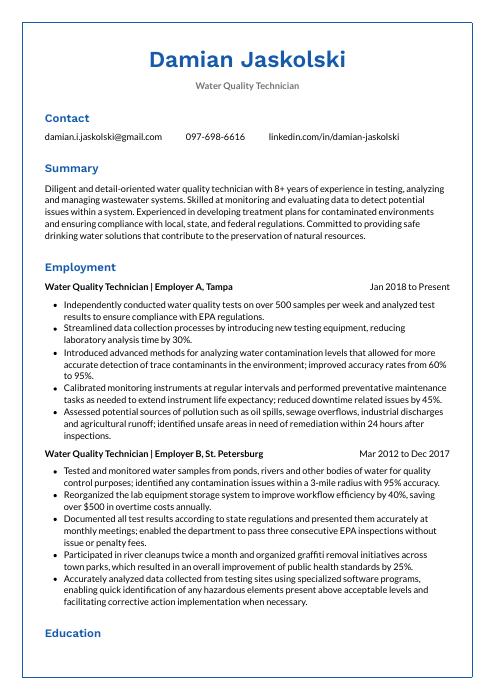 Markhor
Markhor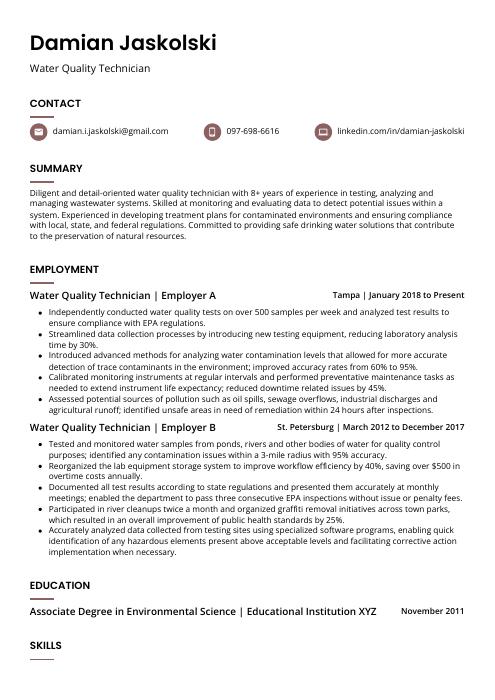 Fossa
Fossa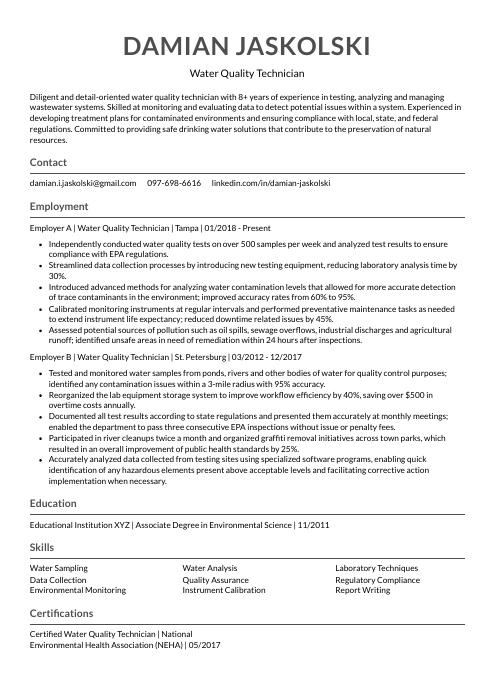 Indri
Indri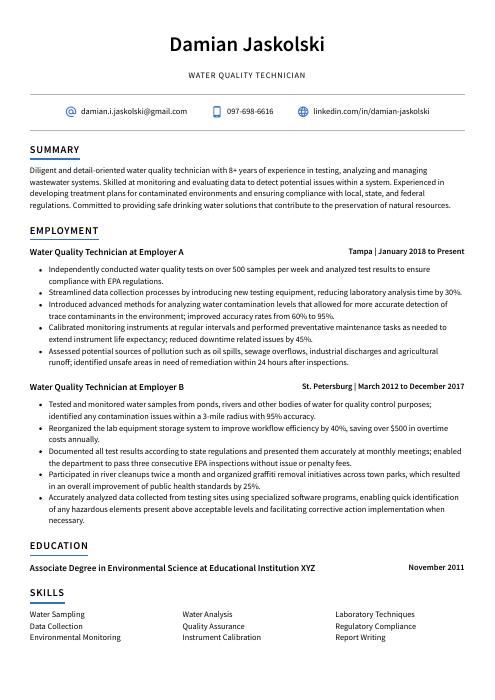 Axolotl
Axolotl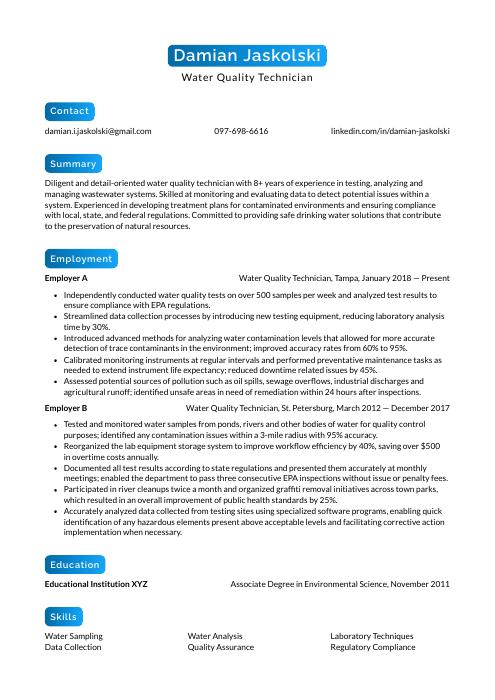 Kinkajou
Kinkajou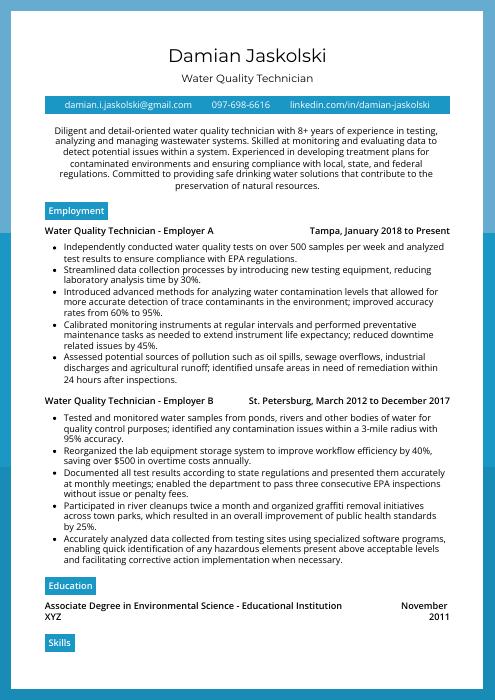 Rhea
Rhea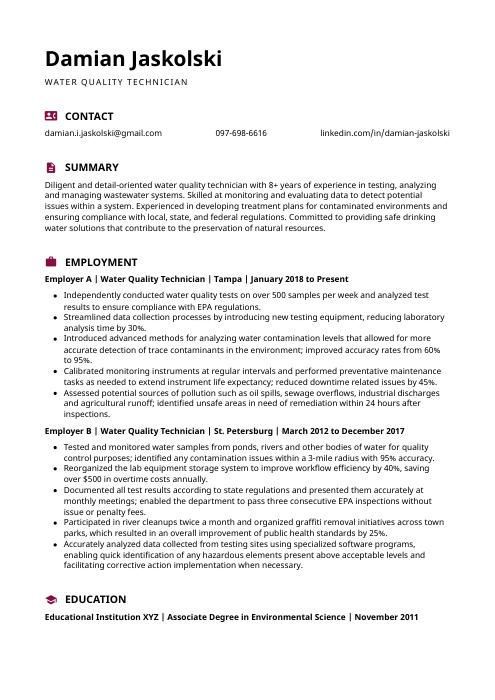 Hoopoe
Hoopoe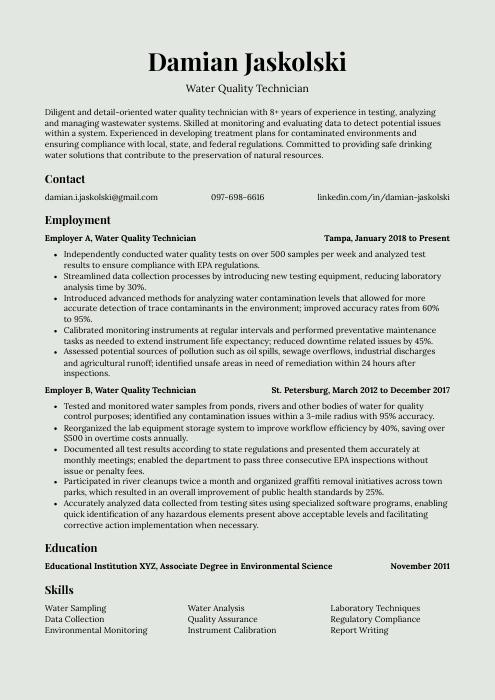 Saola
Saola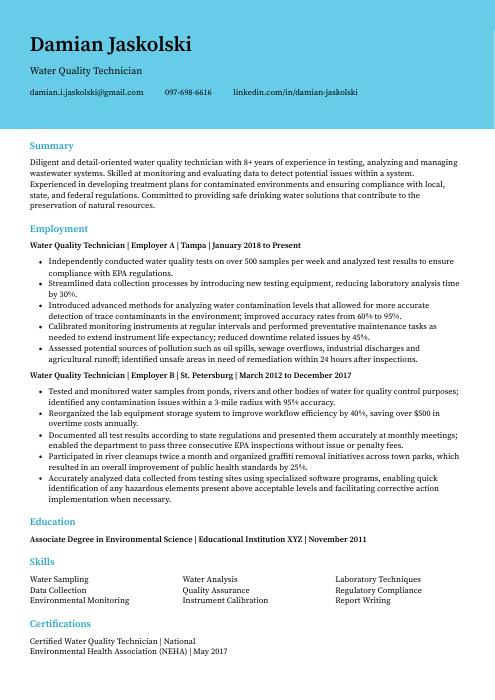 Dugong
Dugong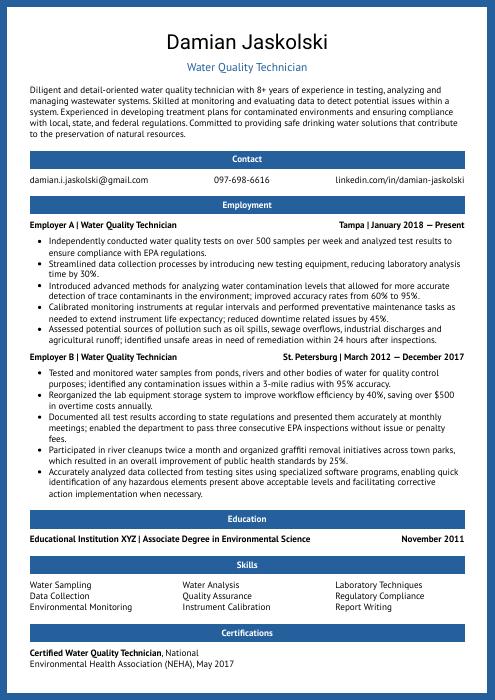 Ocelot
Ocelot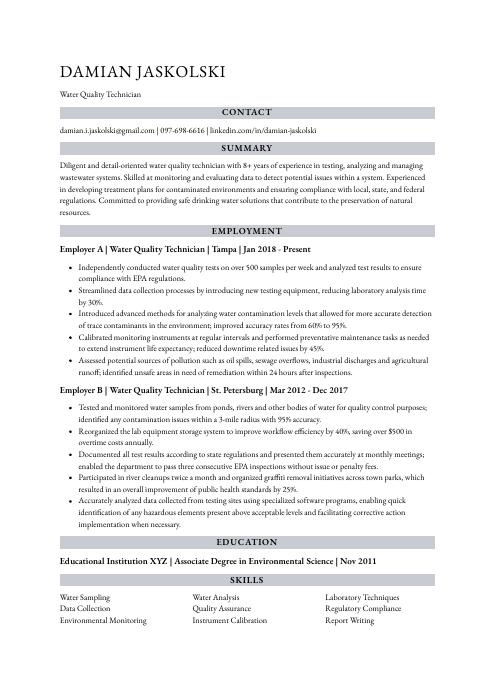 Numbat
Numbat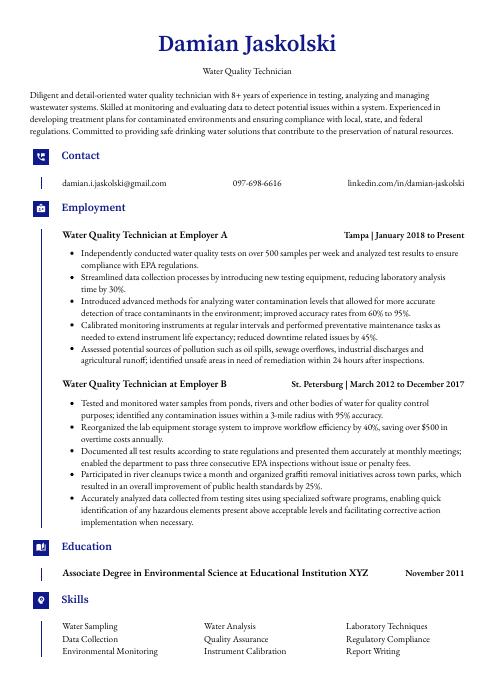 Gharial
Gharial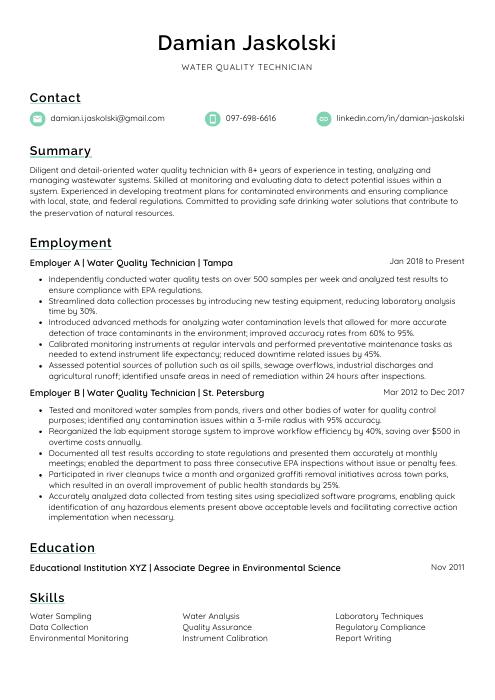 Lorikeet
Lorikeet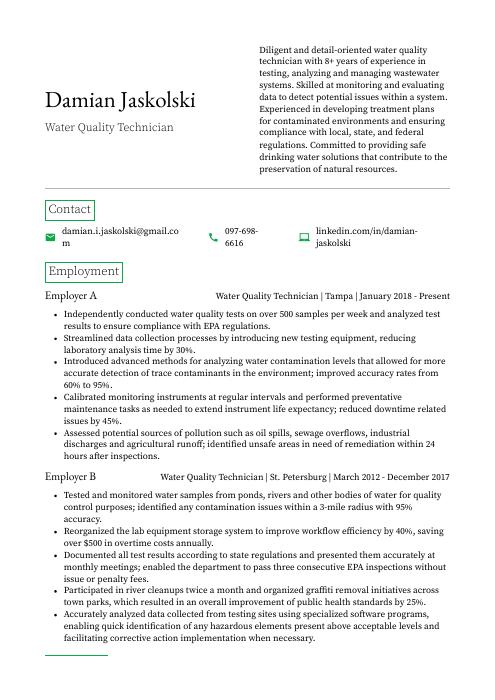 Quokka
Quokka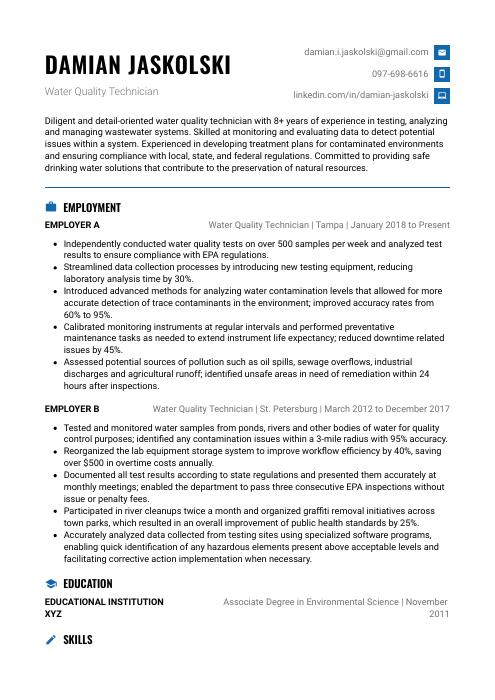 Echidna
Echidna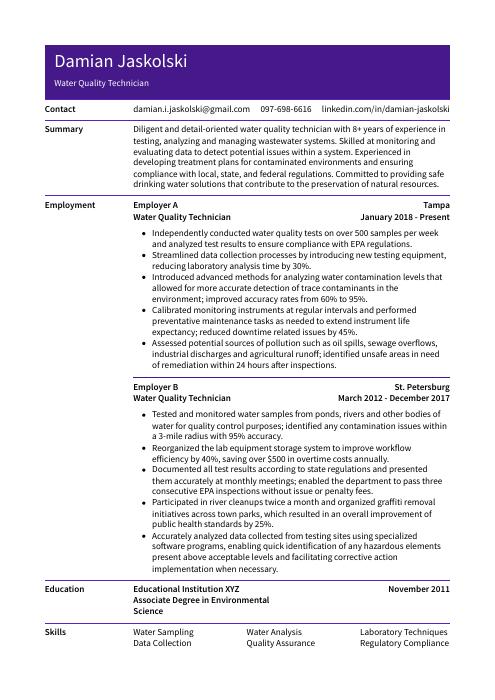 Pika
Pika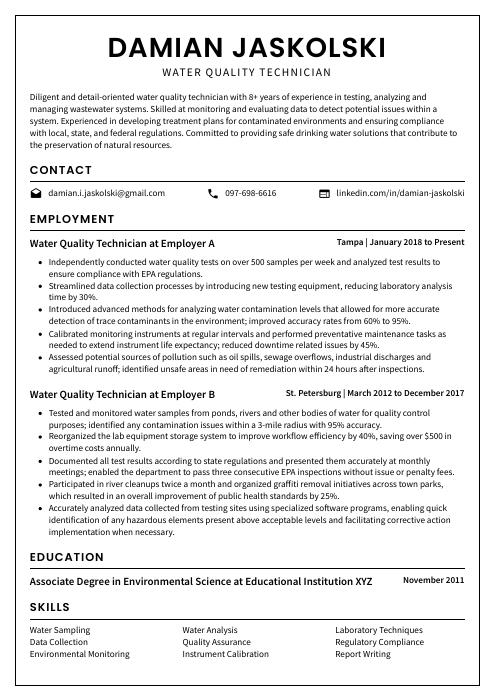 Cormorant
Cormorant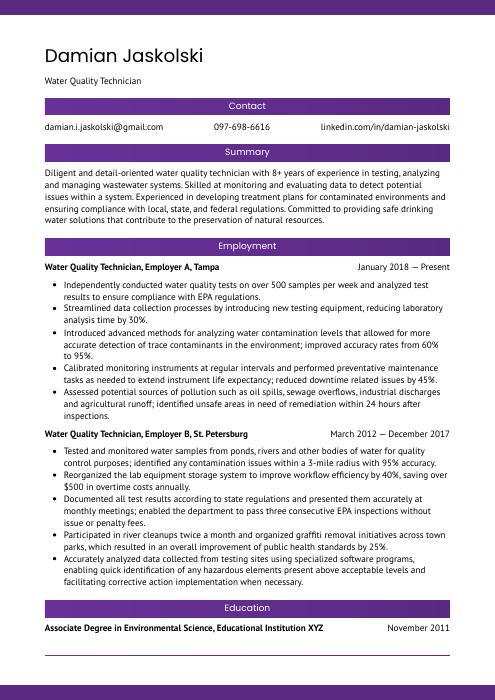 Jerboa
Jerboa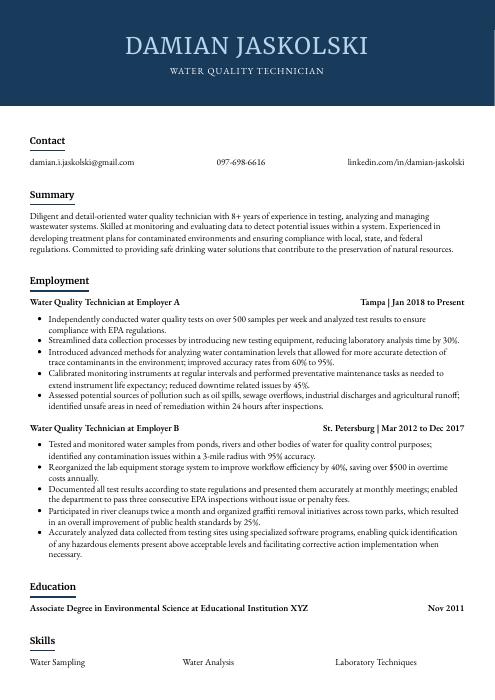 Bonobo
Bonobo Rezjumei
Rezjumei
